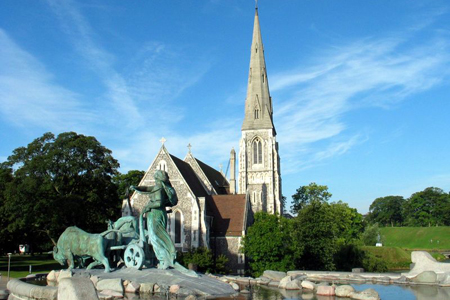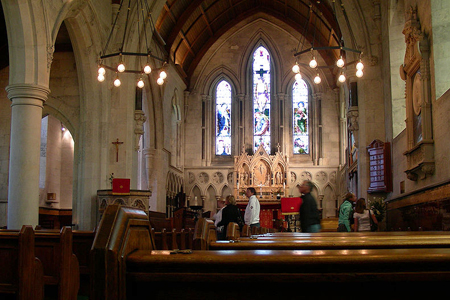| |
 |
 |
 |
| Comment on this report, or find other reports. |
 |
| Our Mystery Worshippers are volunteers who warm church pews for us around the world. If you'd like to become a Mystery Worshipper, start here. |
 |
| Find out how to reproduce this report in your church magazine or website. |
|
|
| 1783: St Alban's,
Copenhagen, Denmark |
 |

Photo: Hansjorn |
 |
Mystery Worshipper:
Jacobsen.
The church:
St Alban's,
Copenhagen, Denmark.
Denomination:
Church of England, Diocese
in Europe.
The building:
This is a smallish spired church, very attractive both outside
and in. The entrance leads to a very narrow corridor, which
with visitors and incoming congregation gets easily congested.
Inside, the church is half tiled to a height of about five feet,
and red brick from then up. There are some lovely old stained
glass windows; I was sitting under the one dedicated by the
British residents of Copenhagen in celebration of 60 glorious
years of Queen Victoria's reign!
The church:
St Alban's is known as "the English church" but ministers
to mixed Danish/English families and those non-Danish who speak
English but whose own church may not be represented in Copenhagen.
There is also a large floating population (like myself this
week) who come as visitors. It is a real community, sporting
all the features of a typical Anglican church: prayer groups,
children's groups, etc. During the last week of August each
year they put on their summer fete, featuring food, music, crafts,
morris dancers, bagpipes, and an organ recital; I was sorry
to be missing that!
The neighbourhood:
The church is set in Churchills Parken, a green and watery corner
of Copenhagen within walking distance of the Little Mermaid
statue. At first sight it's not a particularly residential area,
until one realises that most of the shops also include apartments
on the floors above. The immediate impression on a sunny August
Sunday morning was of tourists and bicycles.
The cast:
The Revd Jonathan Lloyd, chaplain, assisted by a lady and a
gentleman who read the lessons. The chaplain had only been in
post for a week and was heard to murmur that people kept coming
with questions he didn't know the answer to.
The date & time:
Sunday, 16 August 2009, 10.30am.
What was the name of the service?
Holy Eucharist with Baptism (1662 Prayer Book).
How full was the building?
Very full from the back, with bodies rather more spaced out
toward the front. There were many children attached to the baptismal
party.
Did anyone welcome you
personally?
This was interesting. As a matter of policy, tourists are asked
to leave by 10.00am unless they are staying for the service.
A lady was warning people that they only had five minutes to
leave. There was something of a rugby scrum of tourists going
in and out, and members of the congregation going in. The tiny
entrance hall was crammed with helpers, the chaplain, the books,
and various items destined eventually for the following week's
fete. The lady told me to ask the gentleman (which one?) inside
for a hymn book. The first person actually to talk to me was
my neighbour in the pew – but not until the end of the
service. The exchange of peace was somewhat subdued as a result
of the swine flu scare.
Was your pew comfortable?
The pews were standard wood, and both they and the kneelers had a green felt padding. They were reasonably comfortable, but so close to the pew in front that I didnít risk kneeling in case I got stuck!
How would you describe the pre-service
atmosphere?
Very chatty at the back of the church. There were children crammed
into the pews at the font and they were obviously excited about
the event. It was quieter and more reflective in atmosphere
further down the church. About five minutes before the beginning
of the service, the organist struck up a prelude.
What were the exact opening words of the
service?
"In the name of the Father, and of the Son, and of the
Holy Spirit. Welcome to all parishioners and visitors."
We were then told the name of the baptismal candidate, and it
was mentioned that communion was open to all.
What books did the congregation use during the
service?
New English Hymnal, a welcome sheet, and a specially
printed service sheet for the day, with arrows pointing up,
down and sideways to indicate standing, sitting and kneeling
positions, and a bell icon showing which items were to be sung.
There was also a separate sheet with the order of baptism for
children, and another with guidelines for the reception of holy
communion in light of the swine flu pandemic.
What musical instruments
were played?
Organ. There was a small efficient choir, and the mass setting
was a familiar one (Merbecke, I think), so the music was inclusive
for those who wanted to take part.

Photo: Ib Rasmussen
Did anything distract
you?
Well, I suppose it would be unreasonable to mention a crying
baby! But I will say that the pew was very narrow, causing me
to sit at an angle rather than straight on.
Was the worship stiff-upper-lip,
happy clappy, or what?
This was a traditional but relaxed 1662 service with vestments,
candles, and a procession into the church. The chaplain gave
an explanation of the placing of the font by the church door
Ė it's always nice to learn something new. He also invited all
the children to the front of the church, and taught them and
us a short song of praise. In this he was helped by the adult
members of the congregation, who picked it up rather quickly.
The children's part of the service was neatly slotted into the
more traditional material. And there were a lot of hymns, mostly
to standard melodies.
Exactly how long was the
sermon?
7 minutes.
On a scale of 1-10, how good was the preacher?
7 – The chaplain was clear and direct.
In a nutshell, what was the sermon
about?
Churches imprison holy things, but God will escape, as Jesus
escaped from the tomb. Mary is portrayed using two images: the
Madonna with child, and the grieving mother of the Pieta. She
gives space rather than answers, both at the beginning and the
end of life.
Which part of the service was like being in
heaven?
The singing, which we could all take part in.
And which part was like being in... er... the other place?
I couldn't always see everything that was happening on the altar,
and neither could the children. The sight lines were not always
ideal.
What happened when you hung around after the service looking lost?
My neighbour spoke to me – it was her first time too.
At coffee it was easy to chat with the next person in the queue,
who was very friendly.
How would you describe the after-service
coffee?
Coffee, cake, shortcake, juice and fruit were served outside
by the lake. Whatever do they do when it rains?
How would you feel about making this church your regular (where 10 = ecstatic, 0 = terminal)?
8 – I felt very much at home here. The combination of structure
and relaxed approach suited me.
Did the service make you feel glad to be a
Christian?
Yes. This is a community.
What one thing will you remember about all this in seven days' time?
The setting of the church in that green corner, by the lake. |
|
|
 |
 |
 |
| We rely on voluntary donations to stay online. If you're a regular visitor to Ship of Fools, please consider supporting us. |
 |
 |
 |
| The Mystery Pilgrim |
 |
| One of our most seasoned reporters makes the Camino pilgrimage to Santiago de Compostela in Spain. Read here. |
 |
 |
 |
| London churches |
 |
| Read reports from 70 London churches, visited by a small army of Mystery Worshippers on one single Sunday. Read here. |
| |
|
|
|
|


